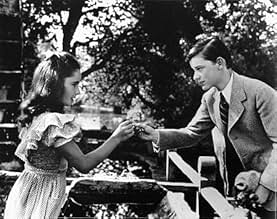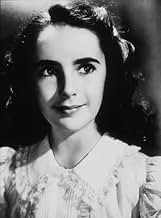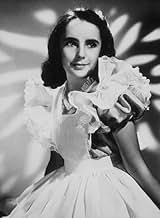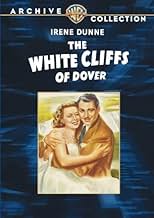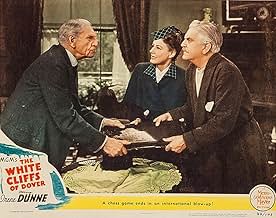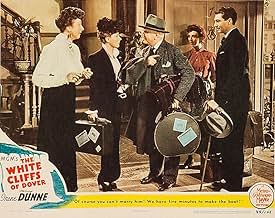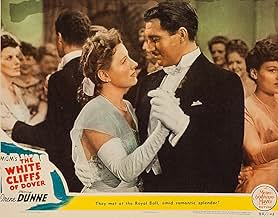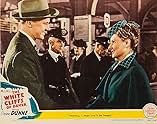CALIFICACIÓN DE IMDb
7.0/10
1.9 k
TU CALIFICACIÓN
Susan viaja a Inglaterra con su padre, asiste a un baile y se casa rápidamente con Sir John Ashwood. Como estadounidense en la nobleza británica, batalla para adaptarse.Susan viaja a Inglaterra con su padre, asiste a un baile y se casa rápidamente con Sir John Ashwood. Como estadounidense en la nobleza británica, batalla para adaptarse.Susan viaja a Inglaterra con su padre, asiste a un baile y se casa rápidamente con Sir John Ashwood. Como estadounidense en la nobleza británica, batalla para adaptarse.
- Dirección
- Guionistas
- Elenco
- Nominado a 1 premio Óscar
- 3 premios ganados y 1 nominación en total
May Whitty
- Nanny
- (as Dame May Whitty)
Harry Allen
- English Cabbie
- (sin créditos)
Wilson Benge
- Chauffeur
- (sin créditos)
Matthew Boulton
- Immigration Officer
- (sin créditos)
Edmund Breon
- Major Rupert Bancroft
- (sin créditos)
Clifford Brooke
- Indian Major in Boardinghouse
- (sin créditos)
Opiniones destacadas
One of the great crimes of the Academy of Motion Picture Arts and Sciences is that Dunne was never given an Oscar....not even an honorary one! Most of her performances transcend time and come off as fresh and natural today as when they were first delivered. She just must have made it look too easy. The woman could do everything! At any rate, this film features another strong performance from her. She plays a young American girl who comes to England with her father (the irascible Morgan) and is soon swept off her feet by dashing and wealthy Marshall. Before they can enjoy any sort of life together, he is called to serve in WWI and they are separated. This is only part of the story as her life unfolds through the next decades and she struggles with letting her son (McDowall, then Lawford) serve in WWII. The film is obviously patriotic and propaganda filled, but understandably so as WWII was still being waged! Dunne is luminescent in the role and is surrounded by a strong array of familiar supporting actors. Notable are Cooper (endlessly watchable in anything!) and Witty (wonderfully crotchety, yet sentimental.) It is a touch jarring to see Taylor grow into Lockhart (young Taylor barely says anything, but "Yes, Sir John".) Lawford is at his most youthful and appealing. The film has a lot of sentiment and melodrama, but also a lot of heart and a little humor. It winds up being quite touching at times and displays a time long gone, but a patriotism that can still be resurrected when events call for it.
This movie telecast recently on TCM was one of many made to promote better relations between the ordinary people of Britain and the USA. Michael Korda claims in his book that his father, Sir Alexander Korda was sent to Hollywood by Churchill, before the USA entered the war, with a mission to persuade his movie mogul friends to make movies with pro British themes. By the time this movie was released,there was a large build up of US service personnel in the UK in preparation for invasion of Europe and resentment towards the GI's was not uncommon. For many of todays viewers it may seem to be a little over the top. Howerver it is a classic, if for the only reason, it was our first glimpse of the fabulous Liz Taylor.
Irene Dunne is all in all herself, tender, transformative and powerful as an American girl who travels to England and falls in love with an English member of the aristocracy. Beautiful Irene marries the Englishman but their honeymoon is cut short on its first day as World War I breaks out. Director Clarence Brown's leisurely mood effect causes us to feel as disrupted as they do. Perhaps it is the soothing joy derived from the old-style black-and-white 35mm Spherical look, a classicism in George J. Folsey's cozy cinematography, that creates such a peaceful atmosphere. Believe me: This feeling is augmented by seeing it on a VHS tape, almost as though you are watching a timeworn relic. When the film quietly, serenely begins, Irene reflects upon her feelings relating to her life in England, a life she never expected to lead from event to event beginning with her purely dabbling arrival. The moving musical score fits like a velvet glove over the sustained close shot of her gorgeous face and the iceberg-thawing sound of her voice.
The backbiting between Irene and her English counterparts early in the film is funny, posing one of the movie's unanxious emotional successes which as well include strong romantic and maternal joys and longings, WWI, brief bursts of rage, mourning, WWII, and the like. A scene in the movie circa the early 1930s sends a chill down the spine, illustrating two polite adolescent German boys, part of an exchange program, staying at the English family's countryside manor. Intimating they were part of early Nazi invasion plans, the boys let it slip in a conversation's startling turn for the less comfortable that they are pondering how the estate's large green would be perfect on which for troop gliders to land.
The backbiting between Irene and her English counterparts early in the film is funny, posing one of the movie's unanxious emotional successes which as well include strong romantic and maternal joys and longings, WWI, brief bursts of rage, mourning, WWII, and the like. A scene in the movie circa the early 1930s sends a chill down the spine, illustrating two polite adolescent German boys, part of an exchange program, staying at the English family's countryside manor. Intimating they were part of early Nazi invasion plans, the boys let it slip in a conversation's startling turn for the less comfortable that they are pondering how the estate's large green would be perfect on which for troop gliders to land.
The only reference to the White Cliffs of Dover comes in at the beginning of the film as we watch Susan and her friend, Sam Bennet, as they are approaching England by sea. The magnificent cliffs are seen in the distance in all their splendor. Susan, clearly moved by the sight, revels on the many things that await her in London where she and her father are going to spend two weeks vacation.
Alas, when they arrive, they are treated to the typical rainy weather, that puts a damp, no pun intended, in her enjoyment of a city and all things English she has always admired. Instead of finding a place that meets all her expectations, Susan has to endure the weather and the prospect of going back without seeing the sights and places she really wanted to see.
Enter the kind Colonel, the man living in the modest hotel where the Dunns are staying. He invites Susan to a society ball where she meets Sir John Ashwood, the man who will become her husband. John is instrumental in her staying in England. Susan never expected to be married into the rich gentry that John belongs to. In fact, the beginning of her life in the family country estate convinces her she doesn't belong.
It's 1915 and WWI arrives without warning. Susan sees in horror how John goes to his regiment and to the front. He eventually dies, but the son that arrives for her is, in a way, a painful reminder of the great loss she suffered. Like his father, the boy grows up and has to go to war, as it's expected of his kind.
"The White Cliffs of Dover" was directed by Clarence Brown, who gave it a great look. Irene Dunne makes a good impression as Susan, the courageous woman who stays in a strange country and has to make a new life for herself and her new family. Alan Marshal is perfect as the dashing John Ashwood.
In minor roles we see Roddy McDowall, who plays the young John Ashwood. Harry Morgan is Susan's father. Gladys Cooper, May Witty, Peter Lawford, Van Johnson, C. Aubrey Smith, and the rest of the cast do good work. The young Elizabeth Taylor is seen as the young Betsy and June Lockhart appears as the grown up girl in uncredited roles.
"The White Cliffs of Dover" is about loyalty for one's country and how tradition plays a role in the lives of all the people one meets in the story, even during the difficult times these characters had to live.
Alas, when they arrive, they are treated to the typical rainy weather, that puts a damp, no pun intended, in her enjoyment of a city and all things English she has always admired. Instead of finding a place that meets all her expectations, Susan has to endure the weather and the prospect of going back without seeing the sights and places she really wanted to see.
Enter the kind Colonel, the man living in the modest hotel where the Dunns are staying. He invites Susan to a society ball where she meets Sir John Ashwood, the man who will become her husband. John is instrumental in her staying in England. Susan never expected to be married into the rich gentry that John belongs to. In fact, the beginning of her life in the family country estate convinces her she doesn't belong.
It's 1915 and WWI arrives without warning. Susan sees in horror how John goes to his regiment and to the front. He eventually dies, but the son that arrives for her is, in a way, a painful reminder of the great loss she suffered. Like his father, the boy grows up and has to go to war, as it's expected of his kind.
"The White Cliffs of Dover" was directed by Clarence Brown, who gave it a great look. Irene Dunne makes a good impression as Susan, the courageous woman who stays in a strange country and has to make a new life for herself and her new family. Alan Marshal is perfect as the dashing John Ashwood.
In minor roles we see Roddy McDowall, who plays the young John Ashwood. Harry Morgan is Susan's father. Gladys Cooper, May Witty, Peter Lawford, Van Johnson, C. Aubrey Smith, and the rest of the cast do good work. The young Elizabeth Taylor is seen as the young Betsy and June Lockhart appears as the grown up girl in uncredited roles.
"The White Cliffs of Dover" is about loyalty for one's country and how tradition plays a role in the lives of all the people one meets in the story, even during the difficult times these characters had to live.
White Cliffs of Dover was made to stoke the flames of patriotism. The film is largely Dunne as a 50 something WWII nurse awaiting a large number of casualties as she looks back on her life in England.
Her memories consist of the tale of a Yankee girl, Irene Dunne as Susan Dunn, who goes on a two week vacation to England with her father and on her last day there meets a member of the English gentry who is instantly smitten by her and talks her into staying and marrying him. At first Susan feels out of her element as Lady Ashwood, but she quickly finds her footing. She and her husband, Sir John Ashwood, don't even have time for a honeymoon as WWI starts and he is off to fight with his regiment. After three years he finally gets a few days leave, but it is long enough to conceive his son, John Ashwood Jr., or John Ashwood II as the British would say.
Irene Dunne always gave good subtle performances in parts that could have easily gotten ham-fisted, and this role is no exception. Frank Morgan as her Yankee dad is a revelation as he is for once not the befuddled comic relief but a spirited American father who wants his daughter home in America before her marriage, and safe from the Nazi bombs as the winds of a second war approach. C. Aubrey Smith lends terrific support as Colonel Walter Forsythe, considered a crackpot at the boarding house where he and the Dunns were staying during their trip, because he claims to have a standing invitation to the most exclusive ball in England, but seems to just be a common pensioner. Well it turns out he really can turn pumpkins into carriages after all. Roddy McDowell plays John Jr., and he is smitten by one of the daughters of the tenant farmers on the estate played by a twelve year old Elizabeth Taylor in only her third credited role. Their scenes together are just too cute.
As with most of the WWII films there are a few lines and a few scenes that get over the top just a bit. There are the American soldiers marching through the streets of London to rousing patriotic songs played by a military band as the film comes full circle. There are the two German preteens who are friends of John Jr. during the early 1930's who just happen to erupt into Nazi propaganda at the dinner table. I was surprised one of them didn't put a comb under his nose and start imitating the Bohemian corporal. And then there is grief that takes all of 15 seconds in spite of its cruel irony because you just HAVE to keep that stiff upper lip! But it's not overdone for a film that is over two hours long, and it does take that long to do the tale justice.
Her memories consist of the tale of a Yankee girl, Irene Dunne as Susan Dunn, who goes on a two week vacation to England with her father and on her last day there meets a member of the English gentry who is instantly smitten by her and talks her into staying and marrying him. At first Susan feels out of her element as Lady Ashwood, but she quickly finds her footing. She and her husband, Sir John Ashwood, don't even have time for a honeymoon as WWI starts and he is off to fight with his regiment. After three years he finally gets a few days leave, but it is long enough to conceive his son, John Ashwood Jr., or John Ashwood II as the British would say.
Irene Dunne always gave good subtle performances in parts that could have easily gotten ham-fisted, and this role is no exception. Frank Morgan as her Yankee dad is a revelation as he is for once not the befuddled comic relief but a spirited American father who wants his daughter home in America before her marriage, and safe from the Nazi bombs as the winds of a second war approach. C. Aubrey Smith lends terrific support as Colonel Walter Forsythe, considered a crackpot at the boarding house where he and the Dunns were staying during their trip, because he claims to have a standing invitation to the most exclusive ball in England, but seems to just be a common pensioner. Well it turns out he really can turn pumpkins into carriages after all. Roddy McDowell plays John Jr., and he is smitten by one of the daughters of the tenant farmers on the estate played by a twelve year old Elizabeth Taylor in only her third credited role. Their scenes together are just too cute.
As with most of the WWII films there are a few lines and a few scenes that get over the top just a bit. There are the American soldiers marching through the streets of London to rousing patriotic songs played by a military band as the film comes full circle. There are the two German preteens who are friends of John Jr. during the early 1930's who just happen to erupt into Nazi propaganda at the dinner table. I was surprised one of them didn't put a comb under his nose and start imitating the Bohemian corporal. And then there is grief that takes all of 15 seconds in spite of its cruel irony because you just HAVE to keep that stiff upper lip! But it's not overdone for a film that is over two hours long, and it does take that long to do the tale justice.
¿Sabías que…?
- TriviaIrene Dunne reads a telegram from her Anglophobe father to a group of English people. Her father begs her not to marry an Englishman she is in love with and tells her "You're a Yankee through and through! Think of Paul Revere! Think of the Old North steeple! Remember the Alabama!" The viewer may become confused at this point. "Remember the Alabama"? Shouldn't it be "Remember the Alamo"? However, since the context of the telegram is anti-British any mention of the Alamo would be irrelevant. What Irene Dunne's father is apparently taking about is the C.S.S. Alabama, one of several Confederate warships that were built in British shipyards over United States protest during the Civil War. These ships attacked U.S. shipping in the Atlantic Ocean. Since Irene Dunne arrives in England in April of 1914 and married just before August 4, 1914 when Great Britain declared war on Germany, the telegram was probably sent close to the 50th anniversary of the sinking of the Alabama by the U.S.S. Kearsarge on June 19, 1864 in the English Channel. The United States sued Great Britain in 1869 over the building of the Confederate warships and was awarded $15.5 million.
- ErroresA gift with a plaque dedicated to First Lady, Dolley Madison, misspells her name "Dolly Madison."
- Citas
Susan Dunn's landlady: [Of Susan]
Susan Dunn's landlady: Such a nice young thing! Not a bit like an American.
- Versiones alternativasElizabeth Taylor's scenes are often deleted in older TV prints.
- ConexionesFeatured in Twenty Years After (1944)
- Bandas sonorasAuld Lang Syne
(1788) (uncredited)
Traditional Scottish 17th century music
Lyrics by Robert Burns
Played during the opening credits and often in the score
Selecciones populares
Inicia sesión para calificar y agrega a la lista de videos para obtener recomendaciones personalizadas
Detalles
- Fecha de lanzamiento
- País de origen
- Idiomas
- También se conoce como
- The White Cliffs of Dover
- Locaciones de filmación
- Productora
- Ver más créditos de la compañía en IMDbPro
- Tiempo de ejecución
- 2h 6min(126 min)
- Color
- Relación de aspecto
- 1.37 : 1
Contribuir a esta página
Sugiere una edición o agrega el contenido que falta


